Hiring candidates with strong analytical skills is necessary to ensure your team can address complex challenges and make informed decisions. This guide provides you with a comprehensive list of interview questions tailored to evaluate candidates' analytical abilities, inspired by our skills required for a data analyst.
This blog post shares various analytical skills interview questions segmented into categories based on candidates' experience levels and specific competencies like data interpretation and problem-solving. Whether you're interviewing junior analysts or seeking top-tier talent, our curated selection will help you assess just what you need.
Using these questions effectively will lead you to hire the most analytically proficient candidates. Complement your interview process with our Analytical Skills Test to ensure a robust evaluation.
Table of contents
15 basic Analytical Skills interview questions and answers to assess candidates
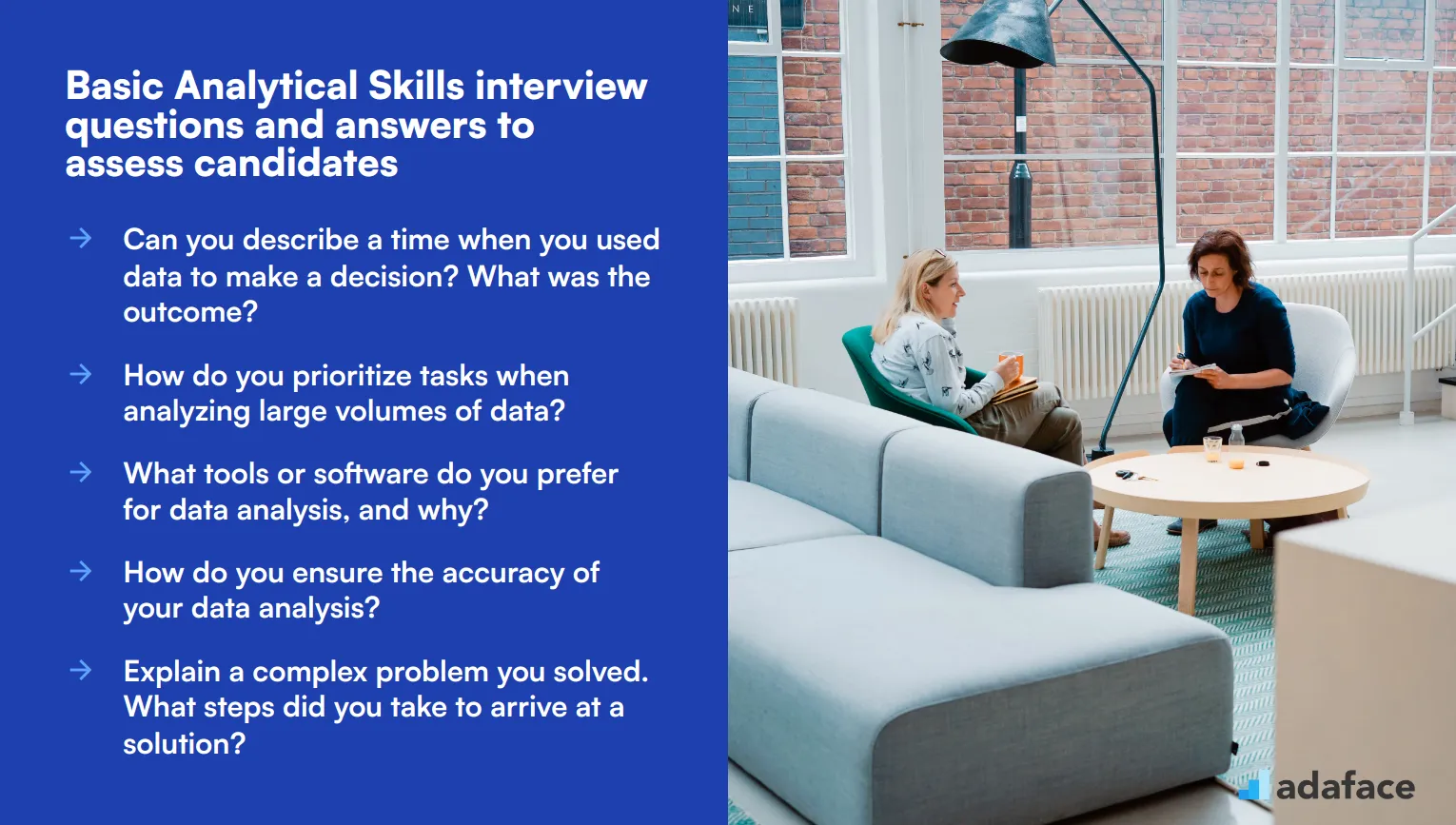
To effectively gauge a candidate's analytical skills, consider using this concise list of interview questions. These inquiries can help you assess how well applicants can analyze data and make informed decisions—a crucial aspect in roles like a data analyst or business analyst. Tailor your questions to fit the specific requirements of your organization.
- Can you describe a time when you used data to make a decision? What was the outcome?
- How do you prioritize tasks when analyzing large volumes of data?
- What tools or software do you prefer for data analysis, and why?
- How do you ensure the accuracy of your data analysis?
- Explain a complex problem you solved. What steps did you take to arrive at a solution?
- How do you approach identifying trends within data sets?
- Can you give an example of how you communicated analytical findings to a non-technical audience?
- What methods do you use to validate your analysis results?
- Describe a situation where you had to analyze data under a tight deadline. How did you manage?
- How do you handle conflicting data or information?
- What techniques do you use to break down complex data sets into manageable parts?
- Can you discuss a time when your analysis led to a significant change in your organization?
- How do you keep up with new analytical tools and technologies?
- What role does teamwork play in your analytical process?
- How do you approach learning a new analytical tool or software?
8 Analytical Skills interview questions and answers to evaluate junior analysts
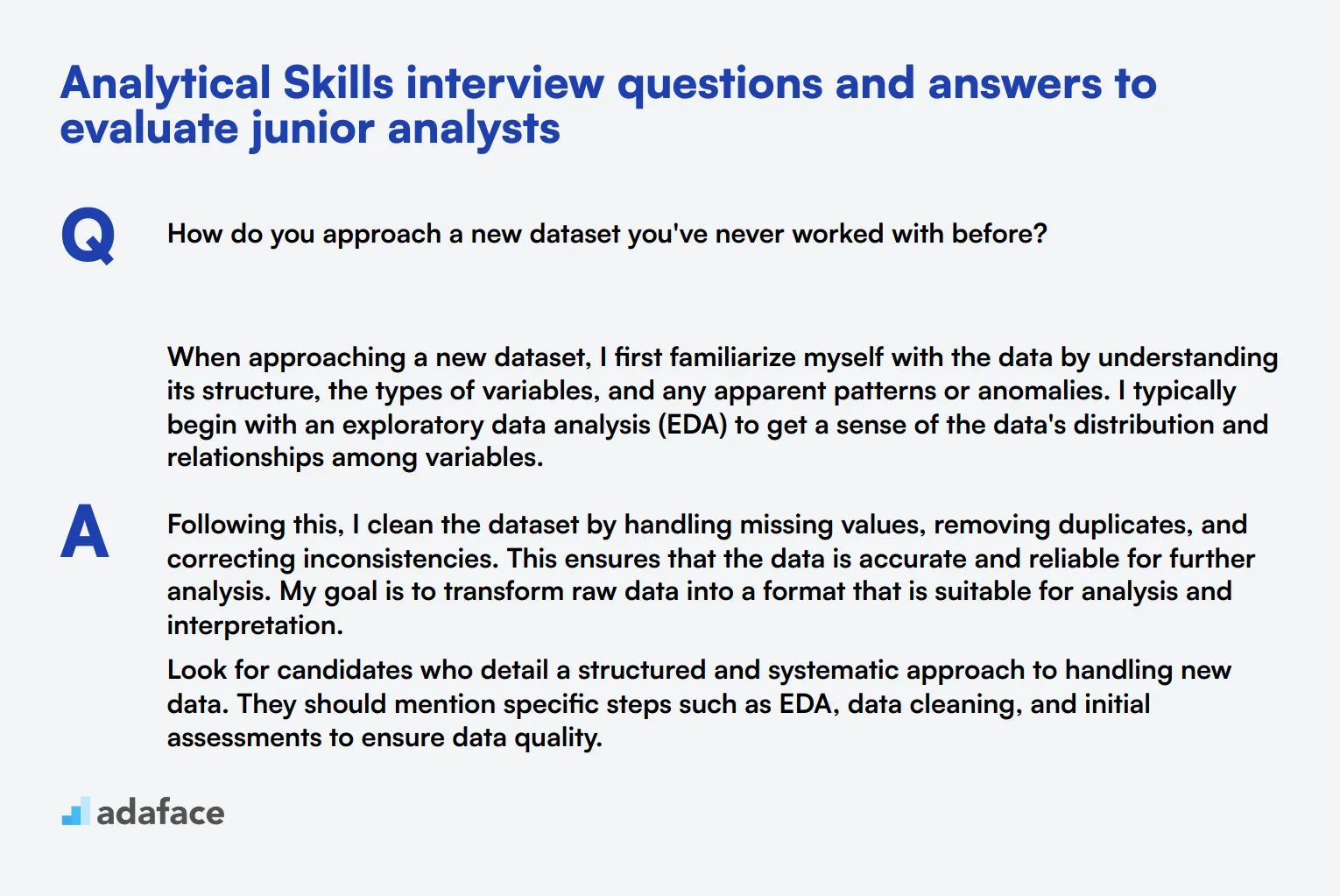
To effectively evaluate junior analysts, it's crucial to ask the right questions that gauge their analytical skills. This list of questions is designed to help you uncover candidates' problem-solving abilities, critical thinking, and data handling expertise during interviews.
1. How do you approach a new dataset you've never worked with before?
When approaching a new dataset, I first familiarize myself with the data by understanding its structure, the types of variables, and any apparent patterns or anomalies. I typically begin with an exploratory data analysis (EDA) to get a sense of the data's distribution and relationships among variables.
Following this, I clean the dataset by handling missing values, removing duplicates, and correcting inconsistencies. This ensures that the data is accurate and reliable for further analysis. My goal is to transform raw data into a format that is suitable for analysis and interpretation.
Look for candidates who detail a structured and systematic approach to handling new data. They should mention specific steps such as EDA, data cleaning, and initial assessments to ensure data quality.
2. Can you explain a time when you had to use multiple data sources to complete an analysis?
In my previous role, I had to analyze customer behavior by integrating data from multiple sources, including sales data, website analytics, and customer feedback surveys. I started by identifying key metrics from each source that were relevant to the analysis.
Next, I merged these datasets, ensuring consistency in data formats and handling any discrepancies that arose during the integration process. Once integrated, I conducted a comprehensive analysis to uncover trends and insights that would inform our marketing strategy.
An ideal candidate should illustrate their ability to handle and merge various data sources, ensuring data integrity and coherence. They should also demonstrate how they derived actionable insights from the integrated data.
3. How do you handle situations where your initial analysis does not provide clear answers?
When initial analysis doesn't yield clear answers, I re-evaluate my approach to ensure I didn't overlook any critical steps or make assumptions that could skew results. I may revisit the data to check for any anomalies or consider alternative methods of analysis.
Additionally, I might seek feedback from colleagues or consult additional resources to gain different perspectives. If necessary, I refine my hypotheses and conduct further analysis to explore other angles that could lead to more definitive conclusions.
Look for candidates who demonstrate persistence and adaptability. They should have strategies for troubleshooting and re-evaluating their approach when initial analysis is inconclusive.
4. Describe a situation where you had to explain a complex analytical finding to a non-technical stakeholder.
In a previous project, I identified a significant trend in our customer retention data that required immediate action. To communicate this to a non-technical stakeholder, I distilled the findings into key points, using visual aids like charts and graphs to highlight the trend.
I avoided technical jargon and focused on the implications of the findings, explaining how the trend could impact our business objectives and what actions we could take to address it. This approach ensured that the stakeholder understood the importance of the data and could make informed decisions.
Candidates should show their ability to translate complex data into clear, actionable insights for non-technical audiences. Emphasize their use of visual aids and straightforward language to enhance understanding.
5. How do you stay updated with the latest trends and tools in data analysis?
I stay updated by participating in online courses, webinars, and industry conferences. I also regularly read relevant blogs, follow thought leaders on social media, and engage with professional networks and discussion forums.
Additionally, I often experiment with new tools and techniques in my own projects to understand their practical applications. This hands-on experience helps me stay ahead of trends and incorporate the latest best practices into my work.
Ideal candidates should demonstrate a proactive approach to continuous learning. They should mention specific resources and methods they use to stay current with industry advancements.
6. Can you describe a time when you had to challenge the data or assumptions made by your team?
During a project, my team used historical sales data to forecast future performance. However, I noticed that recent market changes were not reflected in the historical data, potentially skewing our forecasts. I raised my concerns and suggested incorporating more recent market data to adjust our models.
We conducted a revised analysis, which provided a more accurate forecast that aligned with current market conditions. This improved our strategy and helped avoid potential pitfalls based on outdated assumptions.
Look for candidates who are not afraid to challenge assumptions and provide constructive feedback. They should detail their approach to ensuring data accuracy and reliability, even when it involves questioning the status quo.
7. How do you approach finding errors or inconsistencies in your data analysis?
To identify errors or inconsistencies, I start by validating my data sources to ensure they are reliable. During the analysis, I use techniques like cross-validation, consistency checks, and summary statistics to spot any anomalies or discrepancies.
If I find any issues, I trace them back to the source and rectify them, whether it's correcting data entry errors, addressing missing values, or adjusting calculations. This rigorous approach helps maintain the integrity of my analysis.
Candidates should exhibit a methodical approach to error detection and correction. They should discuss specific techniques and steps they take to ensure their data analysis is accurate and dependable.
8. What steps do you take to ensure your data analysis meets the needs of the business?
I begin by thoroughly understanding the business objectives and key performance indicators (KPIs) relevant to the analysis. This involves consulting with stakeholders to align on the goals and desired outcomes.
Throughout the analysis, I keep these objectives in mind, ensuring my methods and findings directly support the business needs. I also provide actionable recommendations based on my insights, making sure they are practical and aligned with the company's strategic goals.
Ideal candidates should demonstrate their ability to connect data analysis with business objectives. They should emphasize their communication with stakeholders and focus on delivering actionable insights that drive business decisions.
18 intermediate Analytical Skills interview questions and answers to ask mid-tier analysts
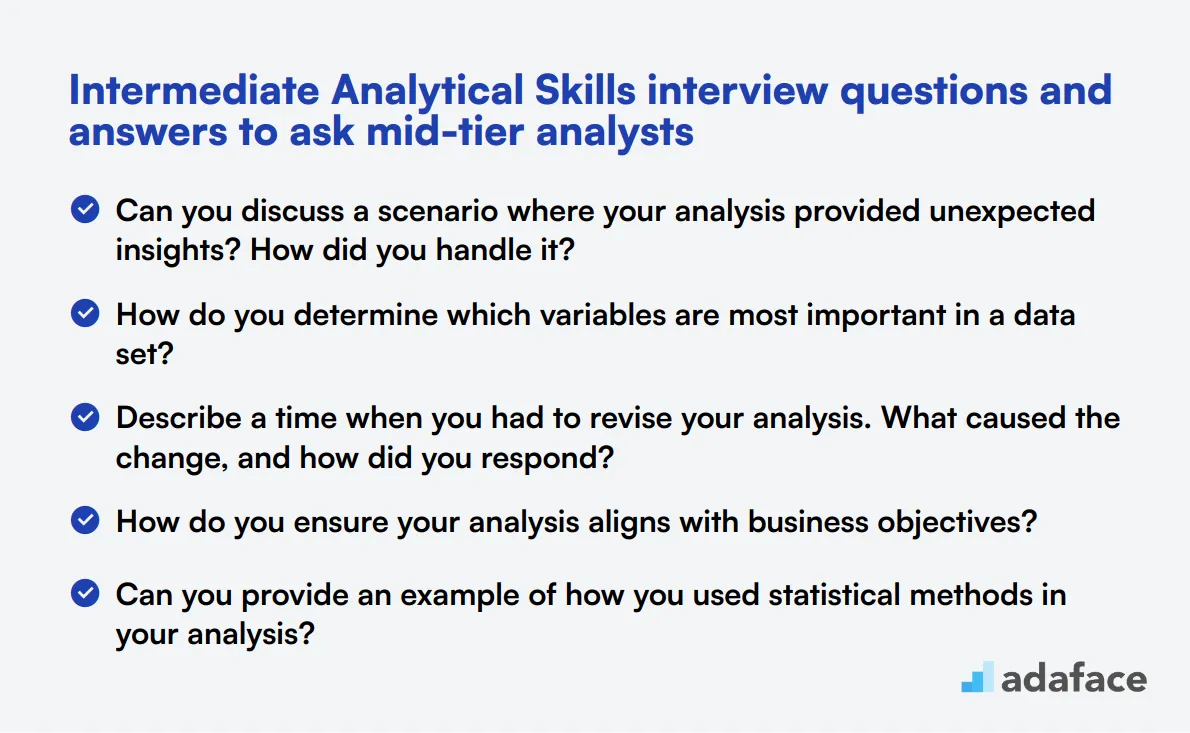
To determine whether your applicants have the right skills to thrive as mid-tier analysts, ask them some of these intermediate analytical skills interview questions. These questions help you gauge their problem-solving abilities, data interpretation skills, and their approach to real-world scenarios. For more details, you can also check out data analyst job description.
- Can you discuss a scenario where your analysis provided unexpected insights? How did you handle it?
- How do you determine which variables are most important in a data set?
- Describe a time when you had to revise your analysis. What caused the change, and how did you respond?
- How do you ensure your analysis aligns with business objectives?
- Can you provide an example of how you used statistical methods in your analysis?
- How do you handle large datasets that may have missing or incomplete data?
- How do you approach developing a new analytical model?
- Explain a time when you had to explain data discrepancies to a skeptical audience.
- What steps do you take to validate the sources of your data?
- Describe a situation where you had to integrate data from different sources. How did you ensure consistency?
- How do you balance the need for thorough analysis with the need for timely decision-making?
- Can you explain a project where your analytical skills directly contributed to a business strategy?
- How do you stay organized when working on multiple analytical projects simultaneously?
- What is your approach to conducting a root cause analysis?
- How do you handle situations where data is not readily available?
- Describe how you would build a predictive model for a new business problem.
- Can you discuss a time when you had to use advanced Excel features for data analysis?
- How do you approach presenting your findings to stakeholders who prefer different formats (e.g., visual vs. detailed reports)?
9 Analytical Skills interview questions and answers related to data interpretation
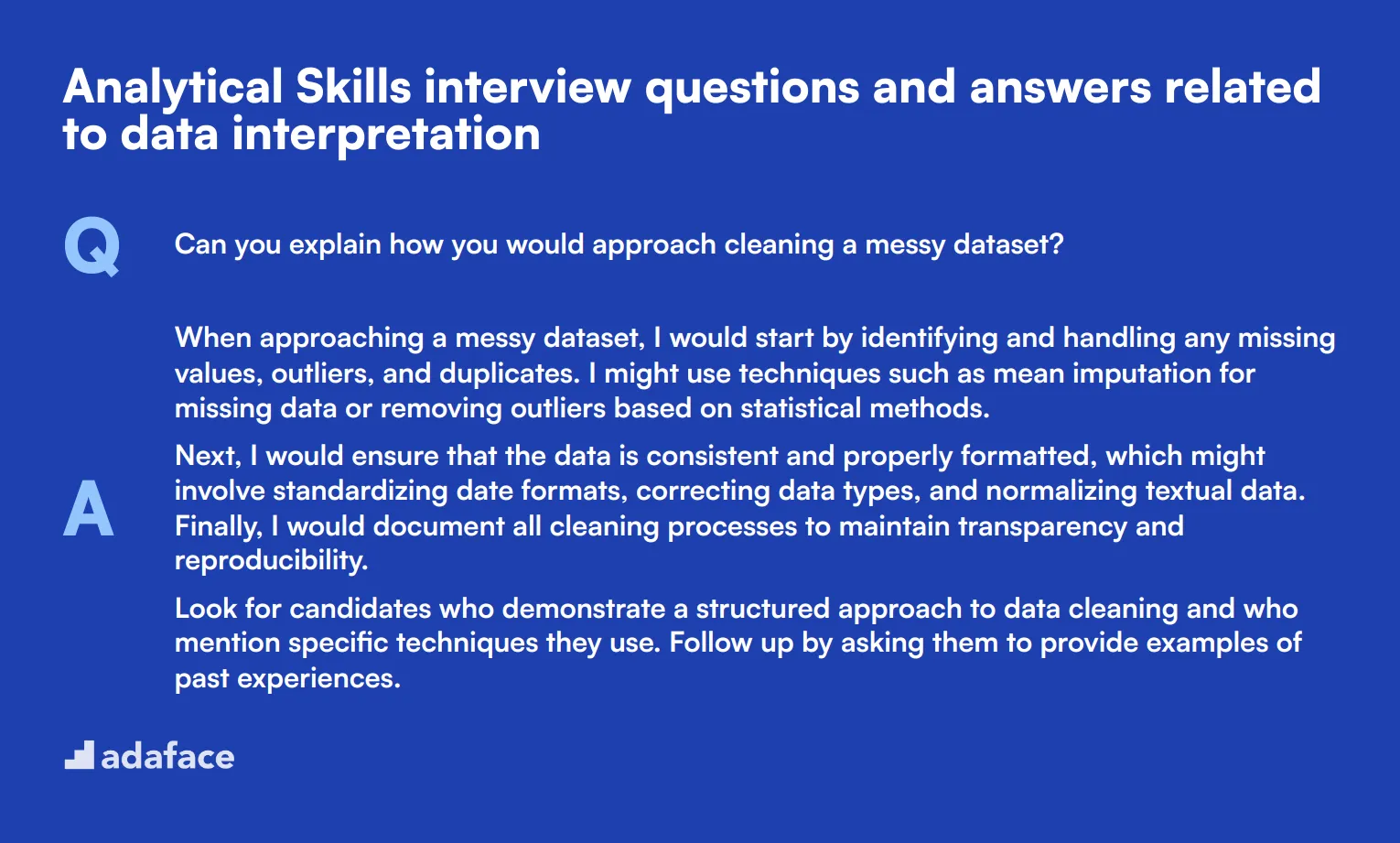
To identify candidates with strong data interpretation skills, it's crucial to ask the right questions during interviews. This list of questions will help you evaluate their ability to analyze data effectively and provide actionable insights, ensuring they can handle the analytical demands of the role.
1. Can you explain how you would approach cleaning a messy dataset?
When approaching a messy dataset, I would start by identifying and handling any missing values, outliers, and duplicates. I might use techniques such as mean imputation for missing data or removing outliers based on statistical methods.
Next, I would ensure that the data is consistent and properly formatted, which might involve standardizing date formats, correcting data types, and normalizing textual data. Finally, I would document all cleaning processes to maintain transparency and reproducibility.
Look for candidates who demonstrate a structured approach to data cleaning and who mention specific techniques they use. Follow up by asking them to provide examples of past experiences.
2. How do you decide which data visualization method to use for a given dataset?
Choosing the right data visualization method depends on the type of data and the story you want to tell. For instance, bar charts are great for comparing categories, while line charts are ideal for showing trends over time.
I also consider the audience and the key message I want to convey. If the goal is to show relationships between variables, scatter plots might be useful. For geographical data, maps are often the best choice.
Strong candidates should show an understanding of various visualization techniques and their appropriate applications. They should also be able to articulate why they choose a particular method for a specific dataset.
3. What steps would you take to identify and handle outliers in a dataset?
First, I would visualize the data using box plots or scatter plots to identify any potential outliers. Statistical methods like the Z-score or the IQR (Interquartile Range) can also be used to detect outliers.
Once identified, I would assess whether the outliers are errors, natural variations, or important findings. Depending on the context, I might decide to remove them, transform them, or use robust statistical methods that minimize their impact.
Look for candidates who can explain different techniques for identifying outliers and who understand the importance of context in deciding how to handle them. Follow up by asking for examples from their past work.
4. How would you conduct a root cause analysis for a sudden drop in sales?
To conduct a root cause analysis, I would start by gathering and analyzing data from various sources such as sales reports, customer feedback, and market trends. This helps to identify any immediate issues or patterns.
I would then use techniques like the 5 Whys or Fishbone Diagram to dig deeper into the possible causes. Collaborating with different departments could provide additional insights and help pinpoint the root cause more accurately.
An ideal candidate should show familiarity with multiple root cause analysis techniques and emphasize the importance of a thorough, data-driven approach. They should also highlight the need for cross-functional collaboration.
5. Can you describe how you would evaluate the effectiveness of a marketing campaign using data?
To evaluate a marketing campaign's effectiveness, I would track key performance indicators (KPIs) such as conversion rates, click-through rates, and return on investment (ROI). Analyzing these metrics helps determine the campaign's overall impact.
I would also segment the data to understand the performance across different demographics, channels, and time periods. This could involve A/B testing and comparing the results against control groups.
Look for candidates who can specify relevant KPIs and who understand the value of segmentation and A/B testing. They should also be able to discuss how they use these insights to optimize future campaigns.
6. Describe how you would handle a situation where your initial data analysis does not provide clear answers.
If my initial analysis doesn't provide clear answers, I would revisit my hypotheses and the data to ensure there were no errors or biases in my approach. I might also explore additional data sources or use different analytical methods.
Engaging with stakeholders to gather more context and insights can also be valuable. Sometimes, a fresh perspective or additional information can illuminate new angles for analysis.
Candidates should show resilience and adaptability in their approach. Look for those who mention collaboration and continuous learning as part of their problem-solving strategy.
7. How do you approach summarizing large datasets for reporting purposes?
To summarize large datasets, I focus on extracting key metrics and trends that align with the report's objectives. Aggregating the data using techniques like pivot tables or summary statistics helps in presenting a clear overview.
I also prioritize creating visualizations such as charts and graphs to make the data more accessible and understandable. Ensuring that the summary is concise yet comprehensive is crucial for effective reporting.
An ideal candidate should mention specific tools and techniques they use for summarizing data. They should also highlight the importance of clarity and relevance in their reports.
8. What strategies do you use to ensure data privacy and security during analysis?
Ensuring data privacy and security starts with following best practices like data anonymization and encryption. I also adhere to organizational policies and regulatory requirements such as GDPR or HIPAA.
Regular audits and access controls are essential to prevent unauthorized access. I would work closely with the IT and security teams to implement these measures effectively.
Look for candidates who demonstrate a strong understanding of data privacy regulations and who emphasize the importance of ongoing vigilance in maintaining data security.
9. Can you provide an example of how you used statistical methods to make a business decision?
In one of my previous roles, I used regression analysis to identify the key factors affecting customer churn. By understanding these factors, we were able to implement targeted retention strategies.
I also employed hypothesis testing to determine the effectiveness of new features in a product. This data-driven approach enabled us to make informed decisions and prioritize development efforts.
An ideal candidate should be able to discuss specific statistical methods they have used and the impact of their analysis on business decisions. Follow up by asking for more details on the methodologies and outcomes.
12 Analytical Skills interview questions about problem-solving
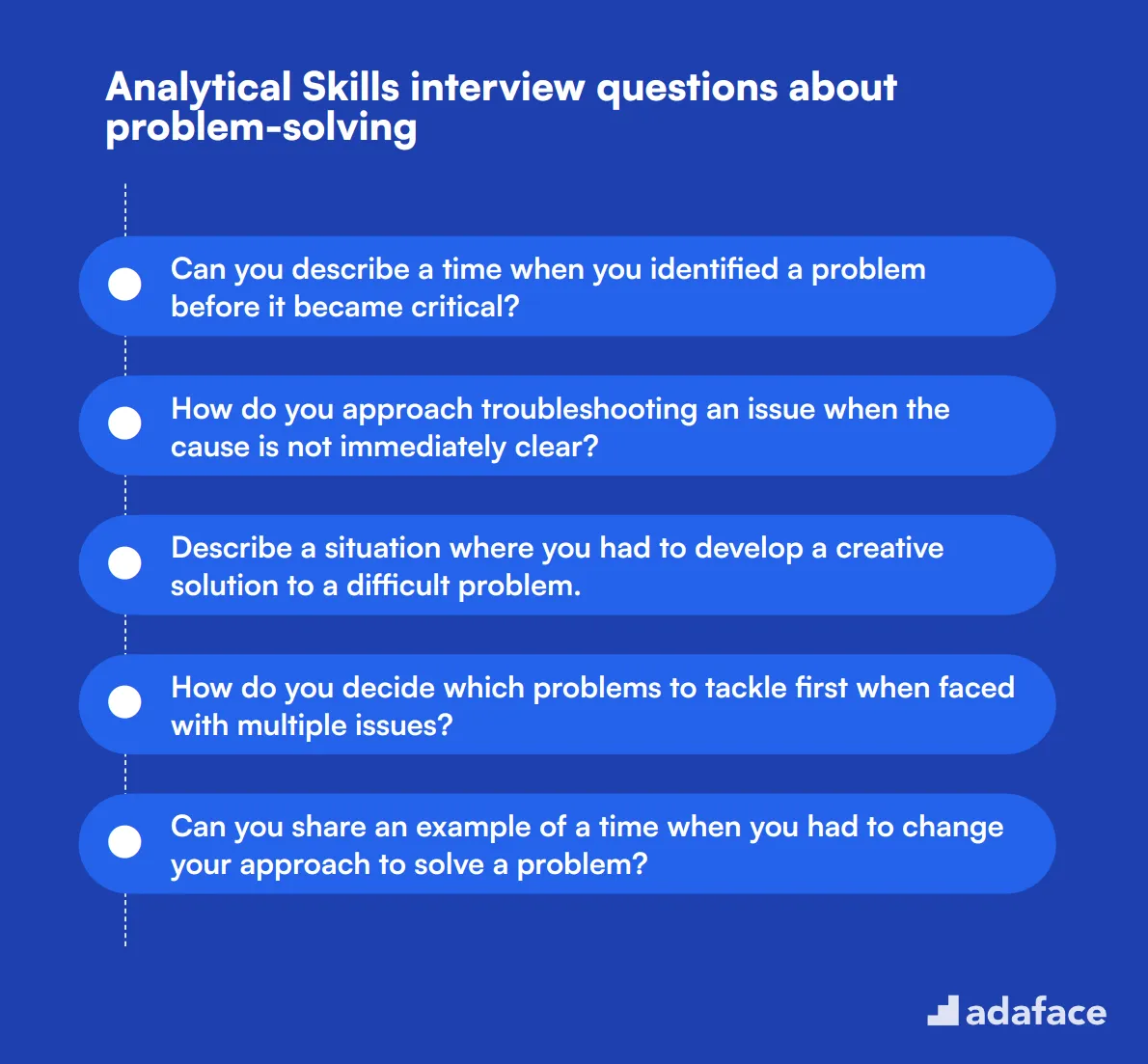
To effectively gauge a candidate's problem-solving abilities, ask them some of these 12 analytical skills interview questions about problem-solving. These questions will help you determine if the applicant has the critical thinking skills necessary to tackle complex issues in roles such as data analyst or business analyst.
- Can you describe a time when you identified a problem before it became critical?
- How do you approach troubleshooting an issue when the cause is not immediately clear?
- Describe a situation where you had to develop a creative solution to a difficult problem.
- How do you decide which problems to tackle first when faced with multiple issues?
- Can you share an example of a time when you had to change your approach to solve a problem?
- What steps do you take to understand the root cause of a problem?
- Describe a scenario where you had to manage a problem with limited resources.
- How do you approach solving a problem that you've never encountered before?
- Can you provide an example of how you used collaboration to solve a problem?
- What is your process for evaluating the success of a solution you implemented?
- Describe a time when you had to persuade others to support your solution to a problem.
- How do you balance short-term fixes with long-term solutions when solving problems?
10 situational Analytical Skills interview questions for hiring top analysts
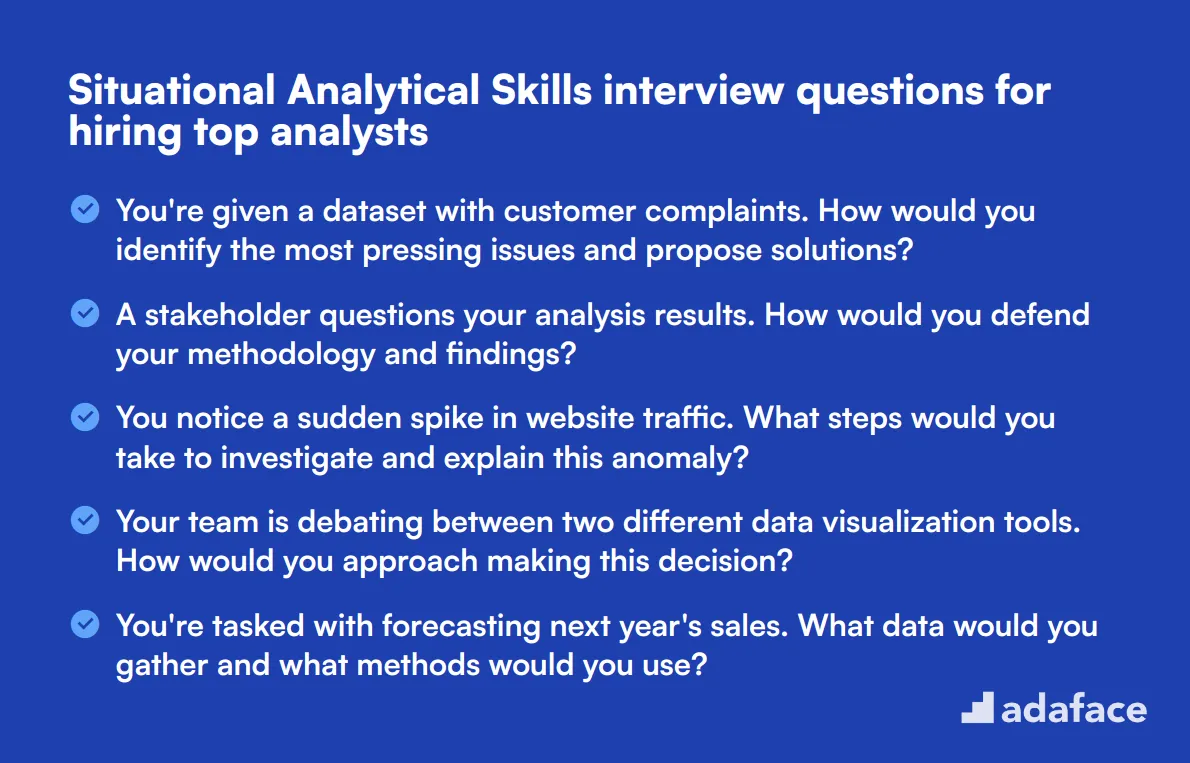
To assess candidates' analytical prowess in real-world scenarios, use these 10 situational questions. They're designed to evaluate how applicants apply their analytical skills to solve complex problems, make data-driven decisions, and handle challenges typical in analyst roles.
- You're given a dataset with customer complaints. How would you identify the most pressing issues and propose solutions?
- A stakeholder questions your analysis results. How would you defend your methodology and findings?
- You notice a sudden spike in website traffic. What steps would you take to investigate and explain this anomaly?
- Your team is debating between two different data visualization tools. How would you approach making this decision?
- You're tasked with forecasting next year's sales. What data would you gather and what methods would you use?
- A non-technical manager needs to understand a complex analysis. How would you present your findings effectively?
- You discover a significant discrepancy in historical data. How would you address and resolve this issue?
- Your analysis contradicts a long-held company belief. How would you present and navigate this sensitive situation?
- You're given limited time to analyze a large dataset for a crucial presentation. How would you prioritize your approach?
- A new data privacy regulation is implemented. How would you ensure your analytical processes comply with these rules?
Which Analytical Skills skills should you evaluate during the interview phase?
While it's impossible to gauge every aspect of a candidate's capabilities in a single interview, focusing on key analytical skills can provide crucial insights. These core competencies are fundamental for roles that require high levels of problem-solving, decision-making, and data analysis.
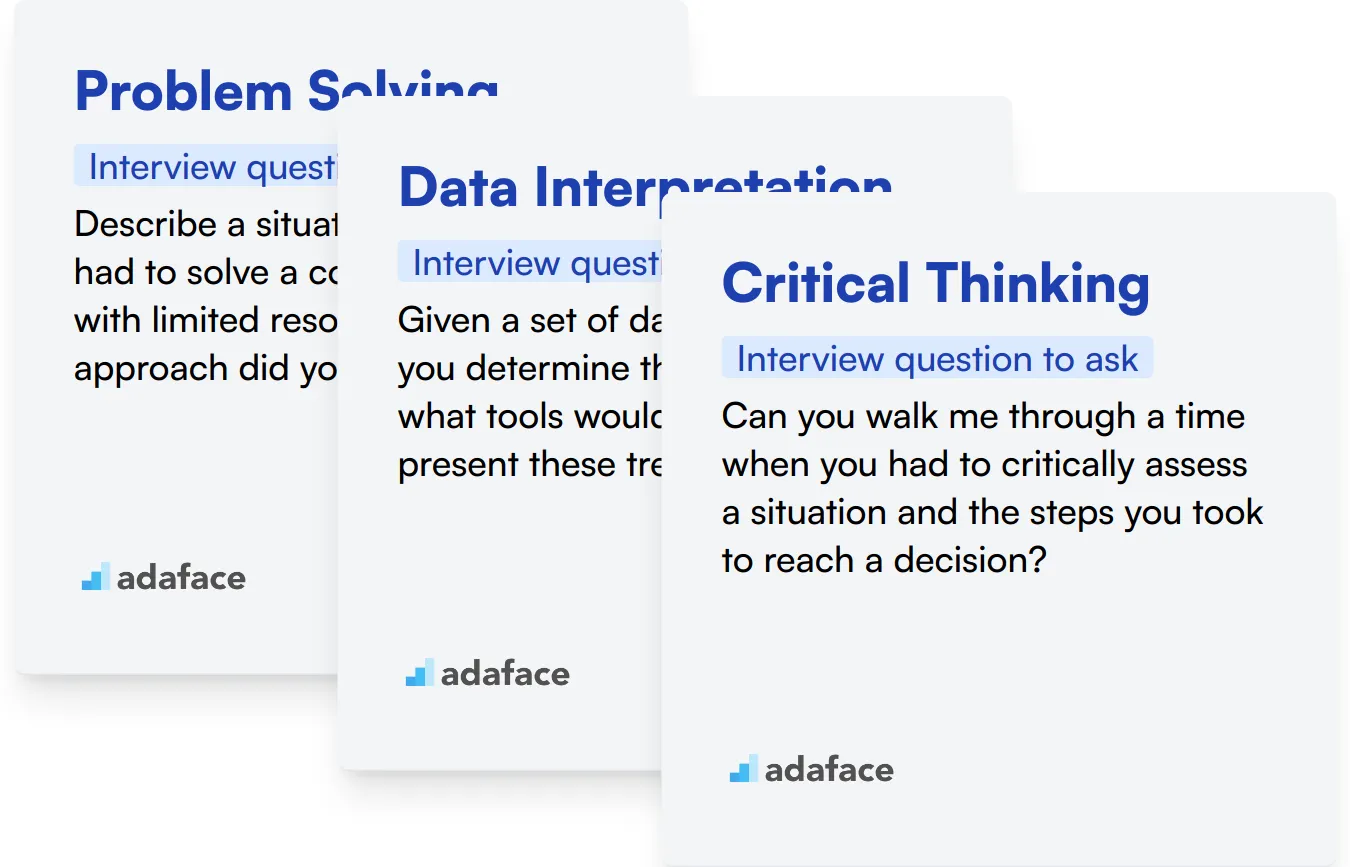
Problem Solving
Problem-solving is at the heart of analytical skills, enabling professionals to manage unexpected challenges and devise workable solutions. It reflects an individual's ability to understand complex scenarios and break them down systematically.
Consider utilizing an MCQ-based assessment to evaluate this skill efficiently. Adaface offers a tailored Problem Solving Test that can help identify candidates with strong problem-solving abilities.
To further assess this skill during interviews, you can pose specific questions that challenge the candidate to demonstrate their problem-solving approach.
Describe a situation where you had to solve a complex problem with limited resources. What approach did you take?
Look for answers that showcase a structured approach to problem-solving, creativity in using limited resources, and a focus on effective outcomes.
Data Interpretation
Data interpretation is critical as it determines how well a candidate can understand and process complex data, which is vital for making informed decisions.
An MCQ assessment can be a practical tool for pre-screening candidates. Adaface's Data Interpretation Test is designed to evaluate this skill effectively.
During interviews, asking targeted questions can help you judge their proficiency in interpreting data.
Given a set of data, how would you determine the key trends and what tools would you use to present these trends?
Evaluate the candidate's ability to extract relevant insights from data and their proficiency with tools that assist in data visualization and trend analysis.
Critical Thinking
Critical thinking is integral to analytical roles, allowing individuals to logically analyze issues and come up with reasoned conclusions.
A structured MCQ test can effectively assess critical thinking. Adaface's Critical Thinking Test can help determine a candidate's ability in this area.
It's valuable to ask questions that require candidates to demonstrate their critical thinking skills explicitly.
Can you walk me through a time when you had to critically assess a situation and the steps you took to reach a decision?
Focus on the candidate's rationale behind their choices and their ability to analyze situations deeply and methodically.
Tips for Conducting Effective Analytical Skills Interviews
Before you put your newfound knowledge into practice, here are some tips to help you make the most of your analytical skills interviews.
1. Implement Pre-Interview Skills Assessments
Start by using skill tests to evaluate candidates before the interview stage. This approach helps you focus on the most promising applicants and saves time in the long run.
For analytical skills, consider using tests that cover various aspects such as critical thinking, problem-solving, and data interpretation. Our analytical skills test and data interpretation test are great starting points.
These assessments provide objective data on a candidate's abilities, allowing you to tailor your interview questions accordingly. By identifying strengths and weaknesses beforehand, you can dive deeper into specific areas during the interview.
2. Prepare a Balanced Set of Interview Questions
With limited interview time, it's key to choose questions that cover a range of analytical sub-skills. Focus on questions that reveal how candidates approach problems and interpret data.
Consider including questions that assess related skills such as critical thinking and logical reasoning. These complementary areas often provide insight into a candidate's overall analytical capabilities.
Don't forget to incorporate questions that evaluate how candidates apply their analytical skills in real-world scenarios. This approach helps gauge their practical problem-solving abilities.
3. Master the Art of Follow-Up Questions
Asking the right follow-up questions is just as important as the initial interview questions. They help you dig deeper into a candidate's thought process and verify their true understanding of analytical concepts.
For example, if a candidate describes their approach to solving a complex problem, follow up by asking them to explain potential challenges or alternative methods they considered. This probes their ability to think critically and adapt their analytical approach.
Harness Analytical Skills Tests to Secure Top Talent
When hiring for roles that demand strong analytical skills, verifying these competencies is key. The most accurate way to assess potential hires is by utilizing skills tests tailored for analysis. We recommend our Analytical Skills Test or the Data Analysis Test to ensure candidates meet your requirements.
After administering these tests, you'll be well-positioned to narrow down the most promising candidates for interviews. To streamline this process and explore further assessment options, visit our Online Assessment Platform or begin by signing up to create your first test.
Analytical Skills Test
Download Analytical Skills interview questions template in multiple formats
Analytical Skills Interview Questions FAQs
Analytical skills are abilities that allow individuals to collect, organize, analyze, and interpret data or information to solve problems and make informed decisions.
Analytical skills are valuable in the workplace as they enable employees to tackle complex problems, make data-driven decisions, and contribute to organizational growth and innovation.
You can assess analytical skills by asking situational questions, presenting hypothetical scenarios, and using case studies that require candidates to demonstrate their problem-solving and data interpretation abilities.
Key analytical skills include critical thinking, data analysis, problem-solving, logical reasoning, research abilities, and the capacity to draw insights from complex information.
Analytical skills tests provide objective measures of a candidate's abilities, complementing interview questions by offering quantifiable data on their problem-solving and analytical capabilities.

40 min skill tests.
No trick questions.
Accurate shortlisting.
We make it easy for you to find the best candidates in your pipeline with a 40 min skills test.
Try for freeRelated posts
Free resources




